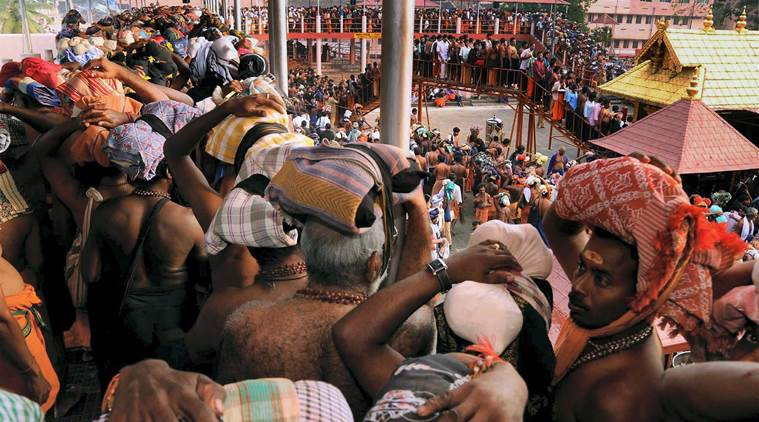 The review pleas were submitted on Monday and allotted dairy numbers on Tuesday.
The review pleas were submitted on Monday and allotted dairy numbers on Tuesday.
Representatives of the palace in Kerala’s Pandalam, where Lord Ayyappa is believed to have grown up, and People for Dharma, an association of women devotees, have sought an open court review of the Supreme Court verdict lifting age restrictions on the entry of women into the Sabarimala shrine, saying it “has the effect of Abrahamising the core of the Hindu faith, namely diversity, and altering its identity”.
The review pleas were submitted on Monday and allotted dairy numbers on Tuesday.
Three other review pleas were already filed on Monday — by the Nair Service Society (NSS) representing the Nair community and Delhi-based NGO ‘Chetana Conscience of Women’ and National Ayyappa Devotees (Women’s) Association.
The counsel representing the National Ayyappa Devotees (Women’s) Association, which was not a party to the original petition, sought to mention the matter before a bench headed by Chief Justice of India Ranjan Gogoi. The bench, however, told him that the review would come in due course.
The petition by palace representatives said its stand had all along been that age restrictions on women in the hill shrine “are based on and draw from the celibate nature, namely Naisthika Brahmacharya of the Deity in that Temple, and not on perceived notions of menstrual impurity as claimed by the Writ Petitioner”.
It said the court should have enquired “whether the practice is essential to the identity of the Sabarimala Ayyappa Temple, and not whether it is essential to Hindu religion since the latter approach completely ignores and does grave injustice to the diverse practices, traditions and schools which exist within the Hindu faith”. The review petition added that “unlike Abrahamic faiths, there is no one Book which codifies and homogenises the various beliefs and practices which exist in the Hindu fold”.
It said that the court had only relied on the position taken by the Travancore Devasom Board before the Kerala High Court, which considered the matter that there were instances of women being allowed into the temple in the past.
The petition by People for Dharma contended that the majority view had not considered why the practice was restricted only to Sabarimala and not other Ayyappa temples. The fact that it was restricted to the Sabarimala temple “only reinforce and demonstrate the fact that the central reason for the restriction is directly traceable to the celibate form of the Deity and not to some misplaced sense of menstrual impurity”, it said.
The petitioners said that “Constitutional morality also requires all arms of the State, including the judiciary, to respect the limits imposed on them by the Constitution in relation to interference with religious practices”.